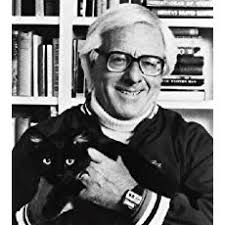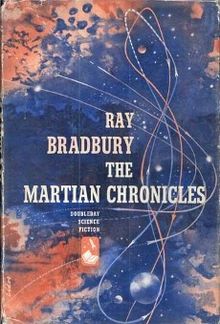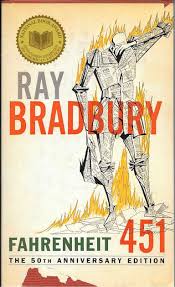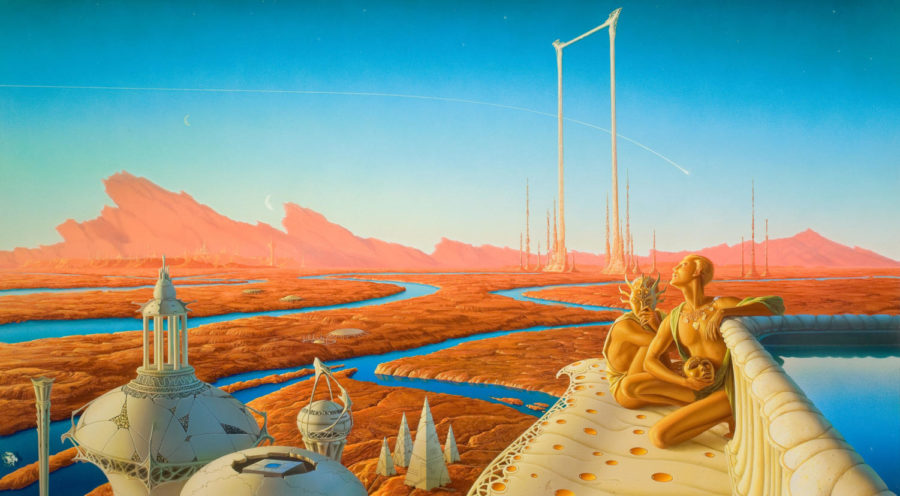Remembering Ray Bradbury
September 10, 2019
When you think about science fiction, you would probably look back on classics such as A Journey to the Center of the Earth and The War of the Worlds and their famous authors Jules Verne and H.G Wells respectively.
 But, one author that I think deserves a special spotlight is the man, the myth, and the legend that is Ray Bradbury.
But, one author that I think deserves a special spotlight is the man, the myth, and the legend that is Ray Bradbury.
Born on August 20, 1920 Ray Bradbury was born in Waukegan, Illinois but moved to Los Angeles in 1934 right in the middle of Hollywood. That summer was a productive one for Bradbury, as he roller skated to movie premieres and tried to get autographs from famous celebrities. Some of these celebrities included the legendary Ray Harryhausen, a special effects pioneer and George Burns a radio show host.
Funny enough, the first amount of money that Bradbury received from his writing was for a joke that he had written and would sell to Burns for his “Burns and Allen” radio show. Soon after, Bradbury started to really hone in on his writing and by the age of 22 he sold his first short story for the price of $13.75, whi ch at the time, was a pretty large chunk of change. Although it would take him another eight years until he would publish his first full-length book, I truly think that it was worth the wait.
ch at the time, was a pretty large chunk of change. Although it would take him another eight years until he would publish his first full-length book, I truly think that it was worth the wait.
His first (and my favorite) book to be published, was The Martian Chronicles, and it was a critical and commercial success. The novel was a collection of short stories that recounted the fictional timeline of colonizing Mars in the near future. The book deals with subjects beyond the usual scope of science fiction, diving into such themes as: humanity, loneliness, and the futility of war. At the time, it was credited for reinventing the Science Fiction genre for a new generation. The book paved the way for Sci-fi to become more than just technological nonsense by reinforcing its themes with powerful metaphors and concepts; something that was completely unheard of at the time.
Although his first book is impressive in own right, his most famous work, which came out three years later, would top its predecessor and become a book that is taught in high schools throughout the country. Fahrenheit 451, released in 1953, is set in a not-so-distant totalitarian future where books are banned and burned on sight. Most people would agree that Fahrenheit 451 is about the dangers or governmental censorship. However, in reality, Bradbury wrote it about the dangers of technology. In the 50’s when it was written, television sets were just becoming popular and commonplace in households across the nation; Bradbury was afraid that mindless television would replace books and reading entirely. This theme still seems like a very prevalent issue today, especially with the rise of social media and the internet. 
However, this isn’t the only thing that Bradbury had predicted or seems oddly relevant today. His work has concepts and even technology that at the time seemed entirely foreign or even alien, but now-a-days some of his science fiction ideas aren’t so fictitious anymore. For example, in the book Fahrenheit 451 he introduces the idea of automated banking machines. I know that sounds so trivial by today’s standards, but back then, this was a revolutionary idea that wouldn’t become a reality until over 20 years later. In the same book, Bradbury introduces devices called “thimbles” or “seashell radios” which are essentially wireless headphones, and large flat-screen televisions that fill entire rooms. One instance of this that amazes me in particular is how he accurately depicted rocket ships in his book The Martian almost twenty years before we put an astronaut on the moon.
Even to this day, we still haven’t sustained life on mars like Mr. Bradbury had imagined, but in the seventy years in between we have felt the impact of his work. Without him bringing new life into the science fiction genre, shows and movies such as Star Wars and Star Trek would not exist. In the end, Ray Bradbury remains one of the greatest science fiction writers of all time and his contributions to the literary world are felt across the globe. So, when you watch the new Star Wars movie, or anything Sci-fi related give a little thanks to Mr. Bradburry, he deserves it.






Joshua Park • Oct 3, 2019 at 8:18 am
Love the respect and research given to Mr. Bradbury. Great article.